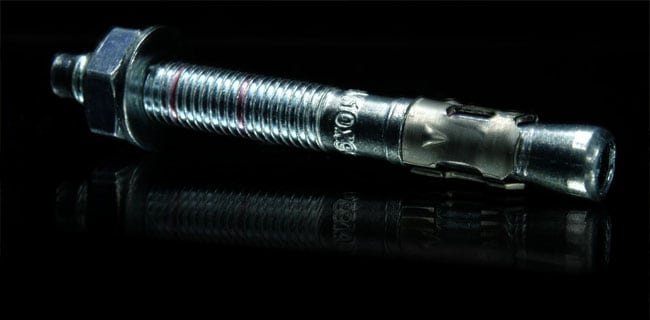The purpose of using an anchor is to distribute the load of tension force and shear force when a structural element is connected to a non-structural element.
Choosing the right anchor for your next project may seem simple enough. That may be true if you are looking for drywall anchors to hang a painting in your house. However, it’s not that simple of a task when selecting the anchors to be used in industrial capacities like oil and gas, construction or manufacturing. Picking the wrong anchor can be critical to the structural integrity of the connected parts — leading to potential disaster.

That’s why we partner with top rated brands like DeWALT. They’re masters in fastener manufacturing and together with our industry expertise, we can help you choose the right fasteners for your next job. We believe it’s our responsibility to make sure you’re well informed and well-supplied. Check out our guide on anchor selection and what you need to know before purchasing.
View DeWALT Anchor & Fastener Guide
Factors to Consider When Choosing a Fastening Anchor
There are anchors for just about any job, but it takes careful consideration to select the right one. The first thing you want to think about is the application in which the anchor will be used. For example, what would be the best anchor to use in concrete block or in an overhead mount?
It would be impossible to list out every use case scenario such as hole sizes and depths, but here are some of the top things you should consider when selecting your next fastener. (Or just give us a call and we’ll help.)
- Substrate Use: Will the anchor be used in a hollow wall, in solid material or in overhead applications?
- Substrate Material: Will the anchor be used in materials like drywall, plaster, concrete or brick?
- Strength Requirements: Does the task require light, medium or heady duty holding power?
- Material Thickness: You may require longer anchors or toggle bolts to accommodate extra depth in material.
- Required Cure Time: Chemical anchors require “cure” time to set before use and may not be recommended in cold temperatures.On the other hand, chemical anchors do not cause expansion stress upon installation.
- Fastener Material: Some jobs require metal anchors, while some require non-conductive and non-magnetic material.
- Regulatory Standards: Be sure to review the standards required for that specific use, especially as it relates to load capacity, vibration, conductivity etc.
What are the Most Common Categories of Mechanical Anchors?
There are many types of anchors on the market designed to serve many functions, including mechanical anchors, chemical anchors, internally and externally threaded anchors and more. Let’s explore what we consider the most commonly used mechanical anchors and their uses:
Wedge Anchors
Wedge anchors are ideal for heavy-duty applications such as connecting materials to concrete or other masonry surfaces. Once a wedge anchor is inserted into a hole, the collar expands and wedges itself into place between the material and the bolt’s shank.
Sleeve Anchors
Sleeve anchors are quick and adaptable anchors ideal for a variety of materials and loads. Once a sleeve anchor is inserted into a pre-drilled hole, the tightened nut pulls the stud end into the expander sleeve which then expands, securing the material in place.
Caulk In Anchors
Caulk in anchors are also known as machine screw anchors and consist of a pre-assembled internal machine screw, an expander cone and caulking sleeve. Caulk in anchors are commonly used in concrete, brick or stone.
Drop In Anchors
Drop in anchors are ideal for anchoring overhead as well as flush with concrete. They require a setting tool that expands the anchor into the pre-drilled hole.
Drive Pin Anchors
Drive pin anchors are ideal for anchoring light loads to masonry materials and are installed using a hammer strike into pre-drilled holes.
Tapper Anchors
Tapper anchors are concrete screw anchors ideal for use in light to medium-duty anchoring applications that secure materials to concrete and other masonry materials.
Wedge Bolt Anchors
Wedge bolt anchors are one-piece removable heavy-duty anchors that resist vibration and are ideal in structural applications.
Wall Anchors
Wall anchors are also known as drywall anchors and are ideal for use in light to medium-duty applications. A wall anchor can create a secure mount that is better than a screw alone on drywall panels or hollow walls.
Toggle Bolts
Toggle bolts are also known as butterfly anchors and have wings that expand inside a hollow wall to form a secure mount.
Expansion Shield Anchors
Expansion shield anchors are ideal for light to heavy-duty anchoring applications that require distribution of shear load and may be subject to vibration and pressure.
Concrete Inserts
Concrete inserts are a pre-set support system that offers flexible attachment in ceilings, walls and floors for pipe, conduit or cable trays.

Explore our wide selection of anchors. Give us a call and we’ll get you squared away with the right anchor and fasteners for your needs.
CONTACT US TODAY TO DISCUSS YOUR NEEDS OR TO SCHEDULE AN ONSITE CONSULTATION AT 314-638-6500 OPTION 4.
We carry everything for your company’s maintenance, repair and operating (MRO) applications including fasteners from top-rated brands like DeWALT, Brighton-Best, Lake Erie Screw Corp, Nucor Fastener, Lindstrom Metric, Auveco, Chicago Hardware and more. If you have questions on how Superior can help you improve operations with better performing products, stop into our St. Louis location, or call 314-638-6500 OPTION 4.

